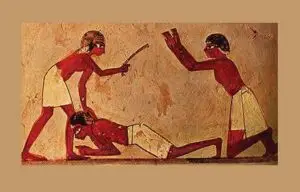“… you have wept in the ears of the Lord, saying, ‘Who will feed us meat? For it was good with us in Egypt; therefore the Lord will give you meat, and you shall eat. Ye shall eat not one day, not two, not even five days or ten or twenty, but a whole month, until it comes out of your noses, and it becomes loathsome to you. For you have rejected the Lord who is among you by whining before Him and saying, ‘Oh, why did we ever leave Egypt?'”
Bamidbar (Numbers) 11:18-20)
The desert, says Westminster Theological Seminary professor Peter Enns, “is starting to become a place of punishment rather than a gracious supply of food and water, a place where God shows his care for his people.”
Professor of Comparative Literature at the Hebrew University of Jerusalem and author of “The Biography of Ancient Israel,” Ilana Pardes writes:
“Against the recurrent command to remember the Exodus, they set up a countermemory: Egypt. Relentless, they persist in recalling life by the Nile, where they took pleasure in fleshpots and other Egyptian delights. […] There is a good deal of fear of life in the nation’s nascent voice and an acute horror of what lies ahead. […] The children of Israel do not succeed in fulfilling His expectations, and He never hesitates to express His disappointment in them. “You neglect the Rock that begot you, forgot the God who brought you forth” (Deut. 32:18), claims Moses in God’s name. The people are blamed for being ungrateful, for forgetting even the unforgettable—the God who miraculously begot them.
Yet, none other than the prophet Jeremiah, in the same collection of books considered the foundations and scaffold of the Jewish understanding of life, opens chapter 2 of the book that carries his name with a poem depicting the relationship in the desert between God and Israel as… a “honeymoon.”
Go proclaim to Jerusalem: Thus said the Lord: I accounted to your favor. The devotion of your youth, Your love as a bride How you followed Me in the wilderness, In a land not sown
Jeremiah 2:2
There’s no saying the amount of rhetorical juggling that has been deployed through the centuries to explain away Jeremiah’s dissonance with those who paint the Exodus generation as an ungrateful and unfaithful one.
The fact is that on one hand there was a school of thought obviously interested in wilderness stories like the above as an explanation for later catastrophes: “Remember, never forget, how you provoked the Lord your God to anger in the wilderness: from the day that you left the land of Egypt until you reached this place, you have continued defiant toward the Lord.” (Deut. 9:7).
On the other hand, as the late Robert P. Carroll, Professor of Hebrew Bible and Semitic Studies in the Department of Theology and Religious Studies at the University of Glasgow, pointed out, the contradiction between these diverse accounts of the desert behavior of the nation arises in the first place because so many different traditions have been combined to create the biblical writings. Seen side by side, the stories are contradictory. Such contradictions are a normal feature of the Bible in relation to historical matters because the essential point of such traditions is not their historical accuracy but their theological function. The negative view of the desert period stresses the weakness inherent in the community.” In other words, there is an ideological interest in painting Israel as weak.
This is correct, says Michael Walzer, emeritus professor at the Institute for Advanced Study in Princeton, New Jersey, and who has written books with titles such as “In God’s Shadow: Politics in the Hebrew Bible”: “The biblical text never underestimates popular fearfulness, and that is its great strength.”
George Coats, a former professor at Lexington Theological Seminary, who wrote a book titled “Rebellion in the Wilderness,” makes the acute observation that in Numbers chapter 11 the verb used in the original Hebrew is “bocheh” (to cry) rather than the vocable “lon” (“to complain” but more accurately translated as “to murmur”). It is not an accusation, a rebellion; it is a cry, a plea.
How could it be otherwise?
After all the Israelites in the wilderness have experienced thirst (“And there was no water for the people to drink…” Exod. 17), hunger, being bitten by snakes, being burned, being swallowed by the earth… Not surprisingly, Professor Pardes writes, “God here turns out to be not the Deliverer of the nation but rather the bearer of death, an abusive Father who seeks to kill His children in the wilderness.”
God? Really? What about the “I accounted to your favor the devotion of your youth, your love as a bride—how you followed Me in the wilderness” referred to by the prophet Jeremiah?
Professor Brevard S. Childs explains the problem by making a distinction between a cry based on a genuine need—whether of food or water—which is made specific, and a complaint without basis in a genuine need.
There may have been situations in the desert in which unjustified complaints were voiced; Numbers 11 may be one such case, depending on the sympathy one would have for the limits of human endurance. In every society there are intolerant puritans for whom no sacrifice is enough.
What we learn here is not about two different views (say Numbers 11 and Jeremiah Chapter 2), we learn something about the character of the people of Israel.
Professor Walzer writes that “there is nothing in Jewish literature like the slave who panders to his masters, who is abject, childish, and irresponsible. The Jews produced another stereotype, the “murmurer,” not someone who is adjusted to his slavery but someone who complains endlessly about his liberation.
Doesn’t sound Jewish enough? Professor Pardes digs in deeper: “There is something about the stiff neck of the nation and the refusal to take national imaginings for granted that reveals an unmistakable force. The nation’s very name “Israel” means “to struggle with God, and in a sense this is the nation’s raison d’être.”


